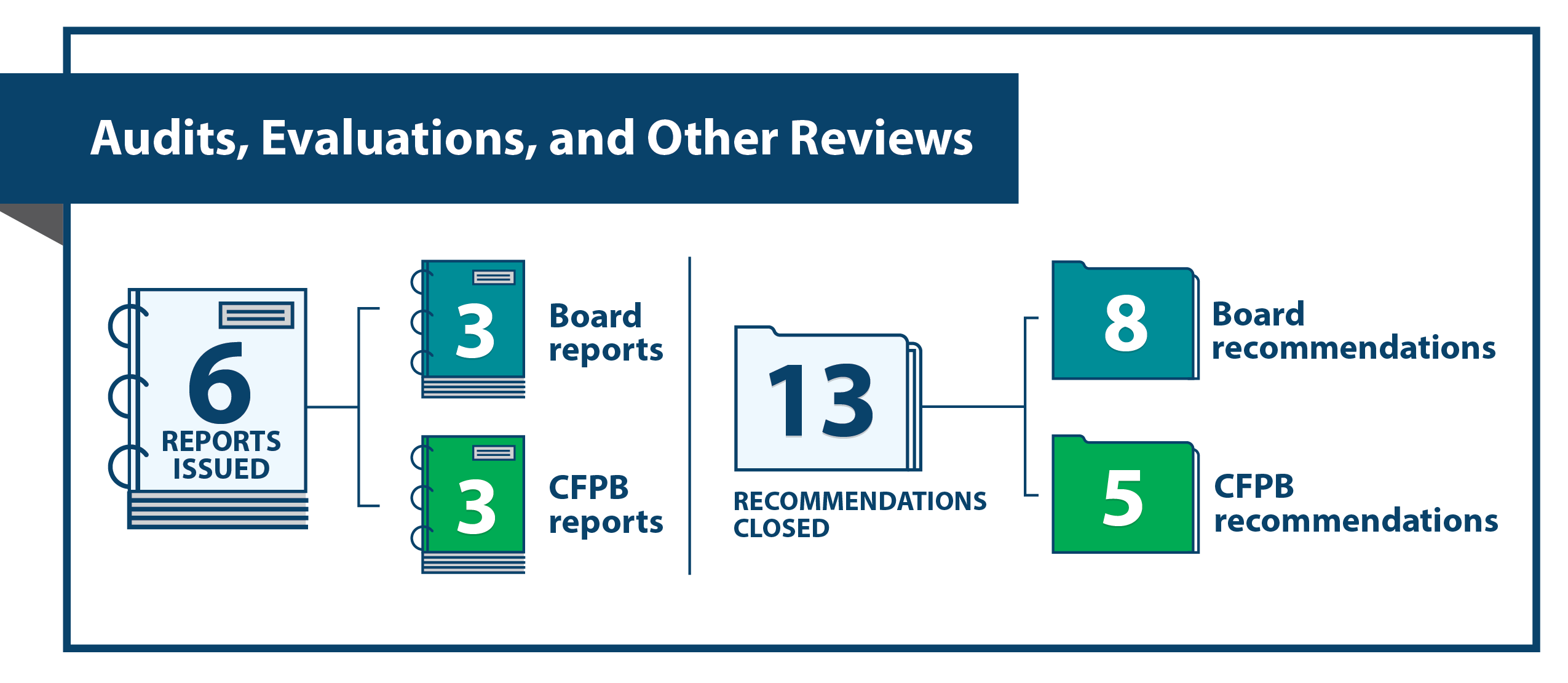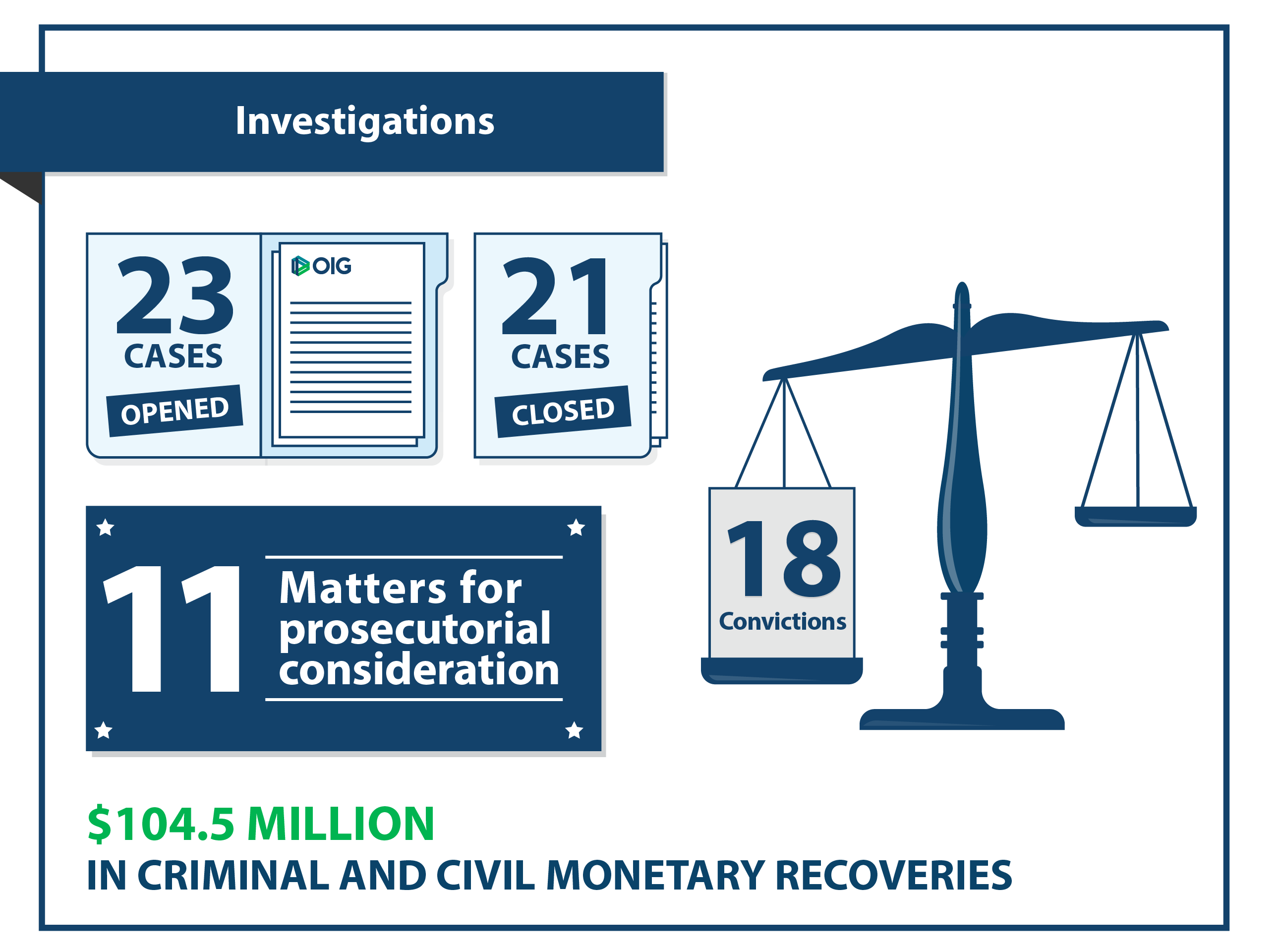April 1, 2025–September 30, 2025
Semiannual Report to Congress
April 1, 2025–September 30, 2025
Semiannual Report to Congress
It is my pleasure to submit this semiannual report to Congress, the first since I was appointed on June 30, 2025, to be the inspector general for the Board of Governors of the Federal Reserve System and the Consumer Financial Protection Bureau. This report covers the period from April 1, 2025, to September 30, 2025.
Among the oversight work we completed during this reporting period was an assessment of the Board's travel card program. We found that while the Board has established and maintained certain controls for its travel card program, its control system needs to be improved to ensure that employees comply with travel requirements. This report contains three recommendations designed to help ensure that the program has effective internal controls. By strengthening its travel policies, implementing additional preventive and detective controls, and enforcing consequences for travel card misuse, the Board can help ensure consistent application of requirements; promote accountability; and reinforce a culture of compliance, integrity, and ethical values.
In a report regarding the CFPB's safeguards for protecting confidential supervisory information (CSI), we identified numerous issues. In 2023, the CFPB declared a major breach that affected about 256,000 consumers and 46 institutions after an employee sent CSI to a personal email account. We found that the CFPB's guidance does not sufficiently limit access to CSI and that its guidance lacks expectations for assessing the severity of breaches and enforcing consequences for responsible employees. Additionally, the CFPB does not have a defined process to notify affected supervised institutions of breaches. We made seven recommendations to address these issues and improve the agency's protection of CSI.
The work of our Office of Investigations continues to send a strong message that those who commit crimes that affect the integrity of our financial system will be brought to justice. In this reporting period, a former bank generalcounsel was sentenced in Connecticut to 48 months in prison for a $7.4 million embezzlement scheme. In another case, an investment adviser pleaded guilty to a bank fraud conspiracy in which he attempted to obtain at least $45.6 million in loans from financial institutions in Nebraska and Iowa by misrepresenting collateral funds and preparing bogus supporting documents. And in a third case, founders of a lender service provider based in Arizona pleaded guilty to participating in a scheme to fraudulently obtain tens of millions of dollars in pandemic relief loans.
Overall, the work of our Office of Investigations during this reporting period resulted in 29 arrests; 23 indictments; 12 criminal informations; 18 convictions; 11 referrals for criminal prosecution; and over $104.5 million in civil judgments, forfeiture, criminal fines, restitution, and special assessments.
The work summarized in this report reflects our deep commitment to effective and independent oversight, and it is my honor to have been entrusted to lead this outstanding organization. I am grateful to the Office of Inspector General staff for their exceptional work, and I look forward to our continued release of impactful reports.
/signed/
Michael E. Horowitz
Inspector General
October 31, 2025
We continued to promote integrity, economy, efficiency, and effectiveness of the programs and operations of the Board of Governors of the Federal Reserve System and the Consumer Financial Protection Bureau. The following are highlights, in chronological order, of our work during this semiannual reporting period.
 The CFPB Can Improve Its Safeguards for Protecting Confidential Supervisory Information
The CFPB Can Improve Its Safeguards for Protecting Confidential Supervisory Information
The CFPB's guidance for safeguarding confidential supervisory information (CSI) does not sufficiently limit access to it or establish expectations for assessing the severity of CSI breaches and enforcing consequences for responsible employees.
The Board Can Strengthen Its Travel Card Program
The Board has established and maintained certain controls for its travel card program, but its internal control system needs to be improved to ensure that employees comply with travel requirements.
The Board Can Enhance Its Approach to the Cybersecurity Supervision of Community Banking Organizations
Procedures for information technology (IT) examinations of community banking organizations (CBOs) do not reflect the evolving IT and cybersecurity risk environment and need to be updated. In addition, Federal Reserve Banks have varying approaches to training examiners who conduct CBO IT examinations and completing and retaining documents used to scope such examinations.
The CFPB Can Improve Its Records Management Program
The CFPB is beginning to prepare for the required transfer of permanent records to the National Archives and Records Administration but has not yet provided CFPB divisions with instructions or a timeline for the transfer. In addition, the CFPB should conduct routine formal evaluations of its records management program to help promote effective records management.
 Former Bank General Counsel Sentenced to Prison for $7.4 Million Embezzlement Scheme
Former Bank General Counsel Sentenced to Prison for $7.4 Million Embezzlement Scheme
James Blose was sentenced in Connecticut to 48 months in prison for an embezzlement scheme he ran at banks where he held high-ranking positions. Over the course of a decade, he stole $7.4 million by fraudulently retaining closing costs from commercial loans, keeping sale proceeds from real estate transactions, and misusing his attorney trust accounts. He used the funds to purchase real estate, luxury vehicles, and private jet charters.
Investment Adviser Pleaded Guilty to $45.6 Million Bank Fraud Conspiracy
Jesse T. Hill, an investment adviser, pleaded guilty to conspiracy to commit bank fraud. He attempted to obtain at least $45.6 million in loans from numerous financial institutions in Nebraska and Iowa by misrepresenting collateral funds and preparing bogus supporting documents. Hill faces up to 30 years in prison and a $1 million fine. He agreed to pay restitution and forfeit any interest generated from the scheme.
Founders of Lender Service Provider Convicted, Pleaded Guilty for Multimillion-Dollar Pandemic Relief Fraud
Stephanie Hockridge was convicted and Nathan Reis pleaded guilty to a scheme to fraudulently obtain tens of millions of dollars in Paycheck Protection Program loans. As cofounders of Blueacorn, a lender service provider based in Arizona, they conspired to submit fraudulent PPP loan applications for small businesses and individuals, charging borrowers illegal kickbacks based on a percentage of the funds received. They each face up to 20 years in prison.